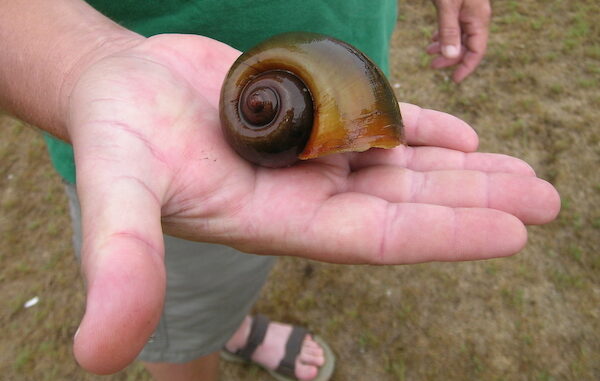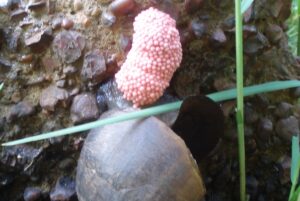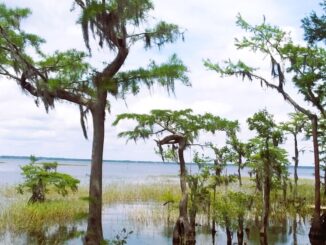
Giant invasive snails with poisonous eggs may sound like a science fiction movie plot, but apple snails are real, and in the Lumber River.
The N.C. Wildlife Resources Commission (WRC) announced Monday that apple snails have been identified along the Lumber River in Lumberton. Native to South America, this is the first known population of apple snails in North Carolina.
Apple snails can damage plants used by many native aquatic species and they have even been observed feeding on amphibian eggs. Additionally, Apple Snails can present human health risks. They may carry rat lungworm, which can cause a potentially fatal disease in humans if the snails are eaten raw or undercooked. The snail’s egg masses also contain a toxin which can cause skin and eye rashes.
Globally, apple snails are an aggressive invasive species and have been introduced in Europe, Asia, and multiple states within the United States. The snails are sometimes used in aquariums, and end up being released intentionally or accidentally into the wild.
A concerned citizen recently sent photographs of suspected egg clusters to the WRC, according to a press release. A WRC biologist inspected multiple sites along the Lumber River and collected additional egg masses that were submitted to the N.C. Museum of Natural Sciences, which confirmed the identification of apple snail eggs.
Subsequent surveys by a biologists turned up adult snails and eggs near the I-95 bridge crossing of the Lumber River, at the High Hill Boating Access Area, and in Fivemile Branch, a tributary to the Lumber River.

Apple snails are most easily recognizable by their distinctive large, bright pink egg clusters, which are laid on solid surfaces, such as tree trucks, concrete, or other vegetation, above the waterline along the edges of streams, rivers or ponds. When the eggs hatch, the young snails drop into the water, where they grow into fully aquatic adults, reaching two to six inches in size, significantly larger than native aquatic snails.
Female snails lay eggs as often as once a week, which allows populations to grow and spread rapidly once established.
Because of their destructive impact, it is unlawful to transport, purchase, possess, sell or stock apple snails in North Carolina. The WRC has added apple snails to the list on the Aquatic Nuisance Species Reporting Tool . People finding suspected apple snails or eggs are asked to file a report, including a photograph and location where they were found.
After documenting the location, egg masses can be destroyed by crushing them and scraping them into the water with any implement such as a stick or a boat paddle, making sure the eggs sink, while avoiding touching them with bare skin. Adult snails can be destroyed by crushing or freezing.
Fishermen and boaters are urged to thoroughly clean boats, live wells and gear when they move from one body of water to another waterway, to avoid possible transfer of the pests.
For more information, go to ncwildlife.org.






















